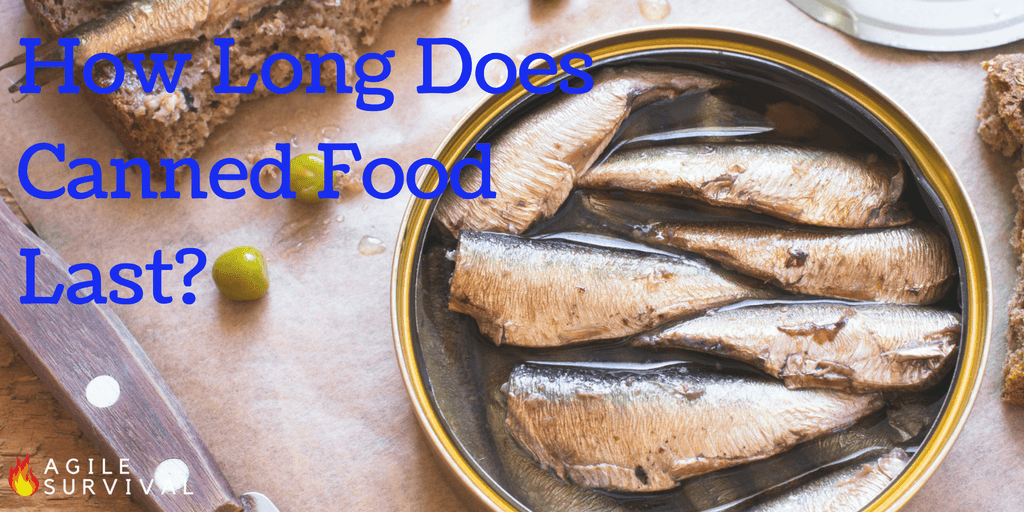
Imagine your family cut off from the grid. No electricity. No way to refrigerate food. Canned foods can save your life. But, just how long does canned food last?
Safety first. Remember these rules before eating a can of food.
"Best By" Dates
You see these dates stamped on canned, jarred or bottled foods. They can say “sell by”, “use by” or “best by”. It all means the same.
Food processing companies want you to eat their food in its best possible condition. They research when vegetables, for instance, begin losing their color, texture and taste. The "sell by" date says how long food can stay in the can before it starts to deteriorate.
Government agencies, such as the United State Department of Agriculture (USDA), rigorously test canned foods. This ensures that “best by” dates are accurate.
Fun Fact: Stores can sell food after the expiration date on its label.
Type of Food
The type of food stored in your pantry or garage impacts how long you can keep it on the shelf. Canned foods fall into two acidity levels:
- high-acid
- low-acid
Foods like tomatoes and citrus fruits are high in acids. While meats, most vegetables, fruits and fish are low acid foods.
You can safely store high-acid foods 12 and 18 months. Lower-acid foods, such as meats and vegetables, can be stored safely for two years or even longer. This comes from many government agency and university studies.
You may not have to worry about getting sick, even if a can is several months past the “best-by” date. You just need to use some common sense. Pay attention to what condition the can is in.
Check the Cans Condition
Your first clue about how safe a food is to eat is the cans condition. A clean and undamaged can probably contains food that hasn't gone bad.
However, if the can is rusty, dented or swollen there could be problems.
When rust builds up, holes too tiny for the eye to see develop in the can or lid. These holes provide a way for microorganisms to make their way into the food inside the can.
Likewise, dented cans may have unnoticeable cracks or holes. The longer a dented can has been store, the more likely it spoiled.
A swollen can may indicate spoiled food. Swelling can also be caused by over-filling or high temperature storage. Best to stay safe and throw any swollen cans away.
Where Cans are Stored
Storage location plays a big role in determining how long canned food will last. It’s tempting to assign a few shelves in your garage or shed to food storage, but that could be a big mistake.
Temperature swings are bad for food. Hot temperatures, in particular, make commercially canned foods unsafe to eat.
You can safely store most canned foods at temperatures up to 85 degrees. However, above 95 degrees, canned food gets suspect. At 100 degrees, you probably have spoiled food inside.
Ideally, store cans at temperatures no higher than 75 degrees. Food will stil be safe to eat. But, it loses its nutritional value as your thermometer rises toward 85 degrees .
Don't place jars of food near light sources. It leads to loss of nutrition and changes in color of the food.
Taste and Smell of Food
Eventually you will open the cans in your pantry or garage. How do you know if they are safe to eat?
Here are some things to watch for:
- If the can lid opens with a hiss or an explosion, throw out the food without even trying it. The contents are likely contaminated with microorganisms, possibly even botulism.
- Toss any can that's leaking before it’s even opened. This is another sign that dangerous microorganisms have gotten inside.
- Stay away from jarred food if its lid is not not completely sealed. Spoiled yeast and bacteria produce gas. That gas expands, breaking the seal.
Once you have opened the can, take a look at the contents. A can with a bubbly liquid should be considered damaged and unusable. If the color of the contents isn’t right, the food is probably contaminated.
Canned seafood sometimes contain what looks like broken glass. These are completely harmless sugar crystals.
Your sense of smell can also help determine if canned food is safe to eat, even if it is past its “best by” date. Don't consume foods that smell acrid or pungent.
If there’s a chemical smell, it’s time to throw out the can and the food with it. You want canned food to smell the way you would expect it to smell.
Finally, taste the food. Cans stored for a significant period of time likely won’t taste as fresh as recently canned foods. But, they’ll still be recognizable as beans, or corn, or tomatoes.
If the can shows no other signs of damage, the food should be safe to eat.
Case Study
Researchers at the National Food Processors Association (NFPA) conducted a well-known study in the 1970s. They analyzed the content of commercially canned vegetables that were more than 40 years old.
The study showed that the food was safe after 40-years. And, it was surprisingly nutritious and tasty.
Likewise, canned red peppers and oysters recovered from a steamboat sunk in the early 1900s were still safe and palatable.
Conclusion
Your family probably won't need to eat canned foods stored for decades, or even a century. Still, it’s good to know canned foods will stay fresh and safe for two years or longer if stored properly.
Feel confident planning food storage to help you and your family through natural disasters or unexpected electrical outages.
